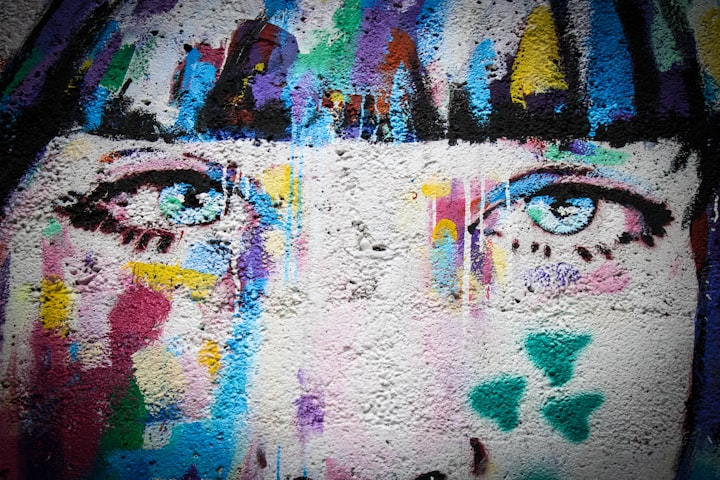Eyes Beyond the Venom: The Wendy I Knew
Abuse smells terrible — but rejection way worse.

“Do you remember Wendy,” asked my sister on FaceTime as if I had some Potterian Pensieve at my disposal.
Because my face obviously told her I didn’t have a clue, she said, to some extent, annoyed, “Sure you remember her, or at least her makeup and tawdry frivolity of sorts. Didn’t she go to school together with you?”.
I finally got some grip on a faint memory from decades past. Wendy was a bit older, already working when I got to the high school. First, she sold makeup and then ended up at the local liquor shop. Venom Wendy, the lurid lady from the liquor store, as I remember people calling her. “What about Wendy,” I asked.
“She is dead,” said my sister, “some drunken jerks beat her so badly that she died in the local hospital the next day”. And with that, I dived into my Pensieve reluctantly but could not stop the memories from coming.
I will tell you the story of Venom Wendy and why it moved me so profoundly.
The boy with a sensitive nose and mind like a prose.
But before I can tell you more about Wendy, I have to take you back — way back when I was about six or seven years old. My uncle was a local insurance broker, and sometimes, after begging him to his breaking point, he would take me along on his endless rounds with clients.
I loved those trips to the neighbouring villages.
Our new Toyota Crown was big and beautiful, with shiny silvery paint and a real clock on the dashboard. That was something — the biggest car in the village — and an electric clock. Our streetcar, which I named Desire, smelled leather, new and something I imagined in my mind, pure Japan. And sin. And secrets. And escape. I was an eccentric but introverted little thing, and I could fill the whole car with my dreams.
Most of those clients of my uncle I have forgotten. The only thing that remained was the car, speed and the feeling of getting away fast and far away.
But then we went to meet one family I never forgot.
How did I meet Wendy for the first time?
Driving to the house where I met Wendy for the first time took a long time. The road was a poorly maintained gravel road — more like a potato field, with pools of dirty water that the melting snow mixed with mud.
The rotten smell of the early spring was suffocating. I saw how the slaughtered summer that winter had hidden became visible, and I hated it. I kept the car window closed and pretended we were driving on a boulevard I had seen in the books.
My uncle was extra careful when driving over these abysmal pools of death. He remembered my father’s comments too well when he last borrowed the car and managed to trash and destroy the left side of the fender. I guessed he tried which was harder, the car or the milestone (milestone won, which came as a surprise to my flamboyant uncle).
My uncle was a character. My father was not. But they were brothers, and let’s leave it to that.
Slowly, we climbed to a small hill in the shadow side where a grey wooden little hut was waiting for a better future. It looked spooky.
When the car stopped, I jumped unwillingly off and walked behind my uncle towards the house. I had a hunch that I would not get the usual cookie and juice in this place — or deliciously warm and fragrant cinnamon buns.
We heard some loud noises coming behind the house and went in the direction of shouting. There was a tall man hunched over a wooden settle, like those on a rowing boat. A skinny girl — a bit older than me, maybe 9 or 10 — was there with a zinc bucket, waiting with scary eyes next to the man.
The man raised an axe, and with a loud thud, the pike lost its head. “Take it in the bucket,” shouted the man to the girl, who darted to pick up the slimy head of the dead fish and put it in the bucket.
And then the man saw us and waved us to follow in the house. He barked to the girl, “Wendy, don’t stay there like a rat hit by lightning; get the fish in the bucket and bring it to the kitchen”.
So, now I knew that she was Wendy.
A dim house, darker than a nightmare.
While my uncle and the tall and petrifying man sat at the table in the living room, I was told to follow Wendy to the kitchen.
The house smelled fuggy, and everything was frowsily disgusting.
Wendy put the zinc bucket on the floor next to the old-style fire oven and turned to me. “You have a cool car,” she said, “my father told me that we don’t need one”.
A long silence.
I tried not to look at the bucket where the smelly dead fish spread their stink. Wendy wiped her hands on her dress to get off the slime, and I shuddered.
I wanted to get out, but a small, almost inaudible voice called from the room next to the kitchen, and Wendy ran there like a tiny, grey mouse.
My curiosity was stronger than my nose. I tip-toed closer to the room, and from the door ajar, I saw a bed and a woman on it. The woman was more like a lump than a human; her hair was untidy, and everything smelled horrible. Wendy moved to help the woman to have a better position by tugging an extra pillow behind her. Then she saw me.
I never forget those eyes. Everything else was so dirty, inhumane and hopeless. But her eyes shone; there was life and love and hope in those eyes. She looked at me and then Wendy and muttered something to her.
“My mother wants to know, are you my friend,” translated Wendy, her mother’s almost incomprehensible stutter.
I couldn’t say anything but nodded, transfixed by the stare of this human wreck, whose eyes told me that she was happy to see her daughter have a friend.
At last, my uncle called and off I went.
Fast forward a few years.
The bus was full of noisy school kids, except for one seat. I was about 12 and hated these cold and smelly buses. Pushing towards the back, I located the vacant seat and sighed for relief.
When I sat, I realised why the seat was vacant.
To my right sat Wendy. At first, I didn’t recognise her, but something in her profile got me back to the smelly house many years ago. With the lead of Dodger, a sturdy macho of all sports imaginable, the other kids shouted, “I guess Venom Wendy has found her next client”. After some profanities, the chorus faded, and the bus started to lull the hormonal youth to dull boredom because they were no match to Wendy’s sharp and fierce comments.
I caught a glimpse of Dodger blushing with anger and embarrassment from the corner of my eye as Wendy’s fang had clearly bitten the bull in the ball. Ouch. I felt an immediate surge of joy and satisfaction.
“I remember you,” said Wendy without looking at me. “You came to our place, but it was long ago, and I guess you didn’t like what you saw”.
I didn’t know what to say, so I went where my curiosity decided to take me and asked about the women in the small room behind the kitchen.
“She was my mother,” explained Wendy.
I asked cautiously, “How is she? Is she better now?” With each question, I felt like I was standing on thin ice that could swallow me any minute. Slowly, Wendy turned to look at me.
I felt shivers going up and down my spine. Her eyes — behind the heavy makeup, gaudy clothes and cheap but overwhelming perfume — were her mother’s eyes. Love, longing and loss were in those eyes with little sparkles of green like moss on the stones in a forest where nobody had gone.
Wendy stared at me like testing and said, “She died soon after you saw her. She had one stroke too many”.
“I am sorry to hear it. Are you OK,” I asked, almost in tears. Wendy smiled and then talked until we came to the bus station and she had to go to work. When we got off the bus, Wendy said, “Thank you for listening. You are the first one who has not called me Venom Wendy. I am not what they say. Do you believe me?”. I nodded and didn’t say anything. And then she was gone. I never saw her again because she moved to the town and never used the bus again.
But her reputation grew. Venom Wendy, the lurid lady from the liquor store with the poison fangs of a black mamba, became a legend. And it was more than most could handle. But somehow, she did.
Back to the FaceTime.
But that was long ago. I paused deep in my thoughts, and my sister reflected on the memories I had told her. “I didn’t know about her mother or abusive father,” she said. “It’s a sad story,” she continued. “I only came across her occasionally, and to me, she didn’t seem as edgy as people said she could be. She even asked about your whereabouts once.”
As an adult, Wendy had been colourful but successful as the liquor store manager. However, her reputation remained, so she never married or had a meaningful relationship. The people in that small town made it clear that she wasn’t accepted as part of their community.
“I understood that she had been a pensioner for quite some time and started to spend more time in the local pub,” explained my sister. “It was one of those nights when she went home after a night out when it happened. Maybe she ran out of venom, and the men were no longer scared of her fangs. She was just over 70. Not a nice end for a lonely life,” said my sister, and we talked about something lighter for the rest of the call.
I still remember those eyes.
As I write this, it’s spring in New Zealand, unlike Finland’s muddy, chilly, grey early springs. Everything is leafy, the flowers are bright, and the birds sing and dance on the branches of lush green bush.
I have come far from my home country, but you cannot leave some things behind. The story of Wendy unfolded and made me realise that wherever we are, there are these small Wendys with their mothers and abusive fathers, but if you look deep into their eyes — you should see love and hope. And if you listen to them, you cannot call them names but see them as human beings.
I realised how lucky I am and that I could have been like Wendy without a loving mother and father. It makes me responsible to be there for the Wendys of this world. When we see them, it is good to remember not to turn up one’s nose but to try to understand and be human.
Snakes bite not because of anger but fear — so let’s approach each other with understanding, not with anger.
R.I.P. Wendy.
About the Creator
Jussi Luukkonen
I'm a writer and a speakership coach passionate about curious exploration of life.
You are welcome to subscribe to my newsletter, FreshWrite: https://freshwrite.beehiiv.com/subscribe






Comments (1)
The story of Venom Wendy is a touching reminder of the importance of empathy.